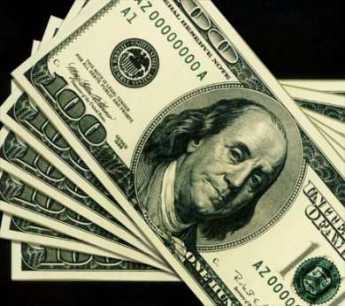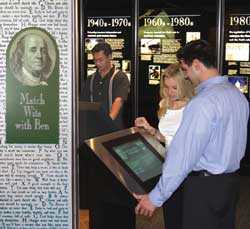Related Topics
Investing, Philadelphia Style
Land ownership once was the only practical form of savings, until banking matured in the mid-19th century. Philadelphia took an early lead in what is now called investment and still defines a certain style of it.
American Finance After Robert Morris
Robert Morris can be fairly said to have made the American Revolution possible.
A Single International Currency?

|
| It's Only Paper |
The Economist, printed in London, refers to the United States in its October 17, 2011 edition as the "World's largest currency union", but goes on to state it only became a true currency union in the Presidency of Franklin Roosevelt. That's sort of the case, even though most people suppose Alexander Hamilton unified American monetary affairs with the Compromise of 1790 which among other things traded the nation's capital away from Philadelphia. No, Hamilton only unified the Revolutionary War debts, which to be sure, at that time were the main debts of the new nation. In time, the country and the economy grew in size until our currency was no longer unified because the individual states and banks were legally free to issue their own money. Nicholas Biddle of the Second National Bank had an irritating habit of buying up the circulating currency of a weak bank and presenting it as a bagful to the teller's window. If the bank was really overextended, it then went bankrupt, and other marginal currency-issuers could observe a bitter stress test about printing unreserved paper money. According to The Economist, the main stabilizer was not a migration of money, but the migration of workers. Unemployed people by the many thousand would move to a state or territory with a labor shortage, a solution made practical by the extremely low cost of real estate. In Europe, a far more practical adjustment remains the moving of funds from one state to another, although there is today enough migration across the Mediterranean to demonstrate how disruptive it is to mix extremes of unwelcome language, religion, and culture. In comparing the American and European experiences we thus have two quite different systems to compare, although distinctive conditions often bring out the main issues. The problem of maintaining a common currency union, for example, is hard enough, while the Europeans have the similar but not identical problem of devising a stable one from a large number of different ones.
After three hundred years of fumbling America has perhaps muddled through to a currency union that works. Resting on the fact that most Americans are either debtors or creditors and the rest mostly don't care, the quantity and value of American dollars since 1913 have been negotiated between banking and the U.S. Treasury with the Federal Reserve as umpire. During that last century we have endured two major depressions and a dozen recessions, abandoned the gold standard and fought a number of wars; but the American currency union has never given serious signs of weakness. It would appear that the main problems with currency unions appear at the beginning, in putting them together. After the transition, things appear to get easier. Bank profits are improved by higher interest rates, while all governments, perpetually in debt, want lower ones. Ultimately, of course, the real tension is between the creditors and debtors, but banks and Treasury seem adequate surrogates. Most creditors place trust in the incentives of banks to prevail, debtors trust government; both sides should have learned trickiness in endless negotiations is futile. What was once a battlefield, is now mostly peaceful; these people actually respect each other. Many people may occasionally dislike an outcome, but all acknowledge the tension produces legitimate compromise.

|
| Match Wits with Ben Franklin |
Aside from some "don't ask, don't tell" mystery that somehow compels assent by regions of the country who feel betrayed by agreements their representatives have made, negotiating postures are pretty simple and clear. It is safely assumed the government wants to inflate; all governments have done so for thousands of years. Therefore, the basic Federal Reserve policy of targeting interest rates to restrain inflation is probably a concession to banks. Banks would mostly want the highest rate that does not cause a recession. Debtors do not mind lower rates leading to just a little inflation, hoping to pay off their debts later with cheaper money. Government, acting as an agent for debtors, additionally knows that rampant inflation loses elections and occasionally, as in inter-war Germany and Austria, destroys the middle class. So, with everyone else resisting inflation, debtors must be satisfied with 2% annual inflation. That's arbitrary, reflecting its origin in the haggling process. Inflation-targeting plus two percent; that's the system.
If only there weren't all those other countries in the world. If they inflate or deflate, we could just float our currency exchange rate to maintain international trade; that isn't so bad, although frequent readjustment of prices is a costly nuisance. But if some country freezes its currency at an unrealistic price, speculators will move money around to take advantage. Enter Gresham's Law (commonly expressed as "Bad money drives out the Good".) Gresham's original phrasing is actually apter: "When two currencies of unequal value circulate together, the good currency quickly disappears." So, when truant governments cheat on currency values, well-behaved countries find their own currency getting hoarded. Potentially, that leads to currency shortages, as happened to Argentina when Brazil devalued in 1999. So, countries running an honest currency nevertheless feel pressure to print more; Brazil "exported its inflation" to Argentina. Plenty of wars have been started for less provocation. When something causes that extra money to come out of hiding, there will be spreading inflation, notwithstanding attempts to isolate foreign inflation by the central banks of more responsible nations. Furthermore, runaway inflation can unsettle governments, as it did in the Argentina example, going from one extreme to the opposite. There is thus wide-spread sympathy for currency unions, even though locally independent currencies can sometimes better adjust to local commotions, typically by devaluing the currency and then rejoining the currency union at a more realistic price. The Federal Reserve in our case would be forced to raise interest rates sky high, promptly triggering housing and stock market crashes. So the point returns; if our Federal Reserve system works so well, why can't everybody does the same thing on an international level. In fact, what's the matter with having one big world currency?
Maybe, some say, we could have a World Reserve Bank, issuing a common international currency. What we now have in place is U.S. money serving as a Reserve Currency for the world. The force behind this system is again Gresham's Law, that since we have the strongest currency in the world when it circulates in other countries in the company of weaker local currencies, it quickly "disappears". That is, it is hoarded out of sight until nothing but local money remains visible. Under these circumstances, only the United States with the world's Reserve currency is able to print money without creating inflation. Unfortunately, that implies that if it should ever weaken, it will quickly reappear and flood the host country with inflation, whereupon the host government will ship it all back to enjoy your own inflation, thank you. Thus, being the reserve currency for the whole world allows you to have some inflation and ship it abroad, but if it ever comes back home, there could be a painful disruption. The last time this happened was when the British Pound surrendered the reserve role to the American dollar. It was a bad time for the British economy.
The question periodically arises whether it might be better to use a "basket" of currencies as the reserve against temporary monetary shortages, with the United States trading away some of its free ride on inflation in return for reducing the risk of someday getting it all back at once.
Using a basket of everybody's money as a pool of international reserves might smooth out the tidal waves, but it probably would not create the same stability from tempests we enjoy with the Federal Reserve. If you regard a country's money supply as one big short-term bond, then a basket of currencies is a basket of bonds, issued by a world full of debtors. In that situation, pressure for worldwide inflation is inevitable. In a world with nationalized banks and/or subsidized banking systems, it is hard to imagine any international banking voice without a strong political component. Mandatory contributions of gold bullion might be considered, but it is hard to think of an adequate substitute for the flexibility of adversary tension between permanent creditors and permanent debtors. The situation is not permanently hopeless however, just remote. The enduring risk is that some nations always have more to lose from a collapse of trade than others. Continuing improvement in world economic conditions may one day make a unified world currency feasible. As St. Augustine famously said, "Make me chaste, but not yet."
REFERENCES
| Runaway America: Benjamin Franklin, Slavery, and the American Revolution, David Waldstreicher ISBN-13: 978-0809083152 | Amazon |
Originally published: Thursday, June 22, 2006; most-recently modified: Wednesday, May 22, 2019
| Posted by: g4 | Dec 9, 2007 12:47 PM |
It was widely reported last week that one of the world's richest supermodels, Gisele Bundchen, opted to be paid in euros because of the dollar's weak outlook.
Her spokeswoman has denied that the model was spurning the dollar, saying Bundchen is paid in the currency of a job's location.
Nevertheless, the euro bought an all-time record $1.4752 on Friday, and the British pound has also been trading at its highest levels against the dollar since the early 1980s.
On Wednesday, the 13-nation euro bought $1.4655 in late New York trading, up from $1.4596 late Tuesday, while the British pound dropped a cent to $2.0563 late Wednesday from $2.0674.